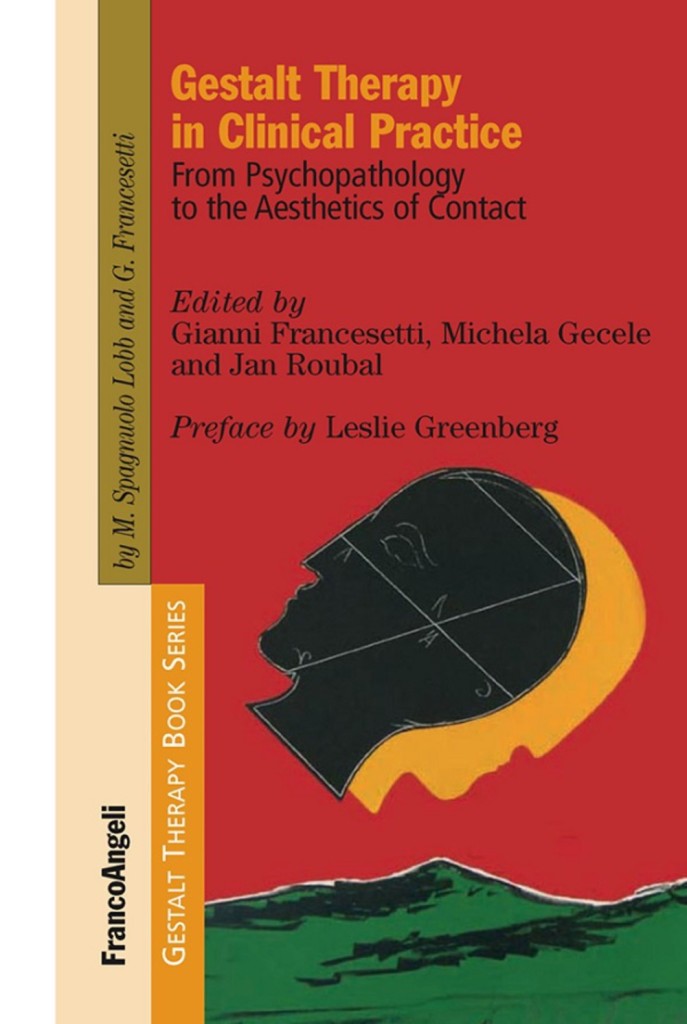
Contents
| Preface, by Leslie GreenbergIntroduction, by Gianni Francesetti, Michela Gecele and Jan Roubal Acknowledgements Part I Basic Principles of Gestalt Therapy in Clinical Practice 1. Fundamentals and Development of Gestalt Therapy in the Contemporary Context, by Margherita Spagnuolo Lobb Comment, by Gordon Wheeler 2. Gestalt Therapy Approach to Psychopathology, by Gianni Francesetti, Michela Gecele and Jan Roubal Comment, by Peter Philippson 3. Gestalt Therapy Approach to Diagnosis, by Jan Roubal, Michela Gecele and Gianni Francesetti To order the book send an email to info@gestalt.it Comment, by Antonio Sichera 4. Developmental Perspective in Gestalt Therapy. The Polyphonic Development of Domains, by Margherita Spagnuolo Lobb Comment, by Ruella Frank 5. Situated Ethics and the Ethical World of Gestalt Therapy, by Dan Bloom Comment, by Richard E. Lompa 6. Research and Gestalt Therapy, by Ken Evans Comment, by Leslie Greenberg 7. Combination of Gestalt Therapy and Psychiatric Medication, by Jan Roubal and Elena Křivková Comment, by Brigitte Lapeyronnie-Robine Part II Specific Contexts and Focuses 8. Social Context and Psychotherapy, by Giovanni Salonia Comment, by Philip Lichtenberg 9. Political Dimension in Gestalt Therapy, by Stefan Blankertz Comment, by Lee Zevy 10. Living Multicultural Contexts, by Michela Gecele Comment, by Talia Bar-Yoseph Levine 11. Gestalt Therapy and Developmental Theories, by Giovanni Salonia Comment, by Peter Mortola 12. Shame, by Jean-Marie Robine Comment, by Ken Evans Part III Specific life situations 13. The Gilded Cage of Creative Adjustment: a Gestalt Approach to Psychotherapy with Children and Adolescents, by Nurith Levi Comment, by Neil Harris 14. Risk of Psychopathology in Old Age, by Frans Meulmeester Comment, by Martine Bleeker 15. Loss and Grief. Sometimes, just one person missing makes the whole world seem depopulated, by Carmen Vázquez Bandín Comment, by Gonzague Masquelier 16. The Power of “Moving on”. A Gestalt Therapy Approach to Trauma Treatment, by Ivana Vidakovic Comment, by Willi Butollo 17. Assessing Suicidal Risk, by Dave Mann Comment, by Jelena Zeleskov Djoric Part IV Specific Clinical Sufferings 18. “What Does it Look Like?”. A Gestalt Approach to Dementia, by Frans Meulmeester Comment, by Katerina Siampani 19. Dependent Behaviors, by Peter Brownell and Peter Schulthess Comment, by Nathalie Casabo 20. Beyond the Pillars of Hercules. A Gestalt Therapy Perspective of Psychotic Experiences, by Gianni Francesetti and Margherita Spagnuolo Lobb Comment, by Gary Yontef 21. Gestalt Therapy Approach to Depressive Experiences, by Gianni Francesetti and Jan Roubal Comment, by Joe Melnick 22. Bipolar experiences, by Michela Gecele Comment, by Daan van Baalen 23. Anxiety Within the Situation: Disturbances of Gestalt Construction, by Jean-Marie Robine Comment, by Myriam Muñoz Polit 24. Gestalt Therapy Perspective on Panic Attacks, by Gianni Francesetti Comment, by Nancy Amendt-Lyon 25. Gestalt Therapy with the Phobic-Obsessive-Compulsive Relational Styles, by Giovanni Salonia Comment, by Hans Peter Dreitzel 26. Anorexic, Bulimic and Hyperphagic Existences: Dramatic Forms of Female Creativity, by Elisabetta Conte and Maria Mione Comment, by Irina Lopatukhina 27. Gestalt Approach to Psychosomatic Disorders, by Oleg Nemirinskiy Comment, by Giuseppe Iaculo 28. Relational Sexual Issues: Love and Lust in Context, by Nancy Amendt-Lyon Comment, by Marta Helliesen 29. Personality Disturbances. Diagnostic and Social Remarks, by Michela Gecele 30. Borderline. The Wound of the Boundary, by Margherita Spagnuolo Lobb Comment, by Christine Stevens 31. From the Greatness of the Image to the Fullness of Contact. Thoughts on Gestalt Therapy and Narcissistic Experience, by Giovanni Salonia Comment, by Bertram Müller 32. Hysteria: Formal Definition and New Approach to a Phenomenological Understanding. A Psychopathological Reconsideration, by Sergio La Rosa Comment, by Valeria Conte 33. Violent Behaviours, by Dieter Bongers Comment, by Bernhard Thosold and Beatrix Wimmer References Authors |
